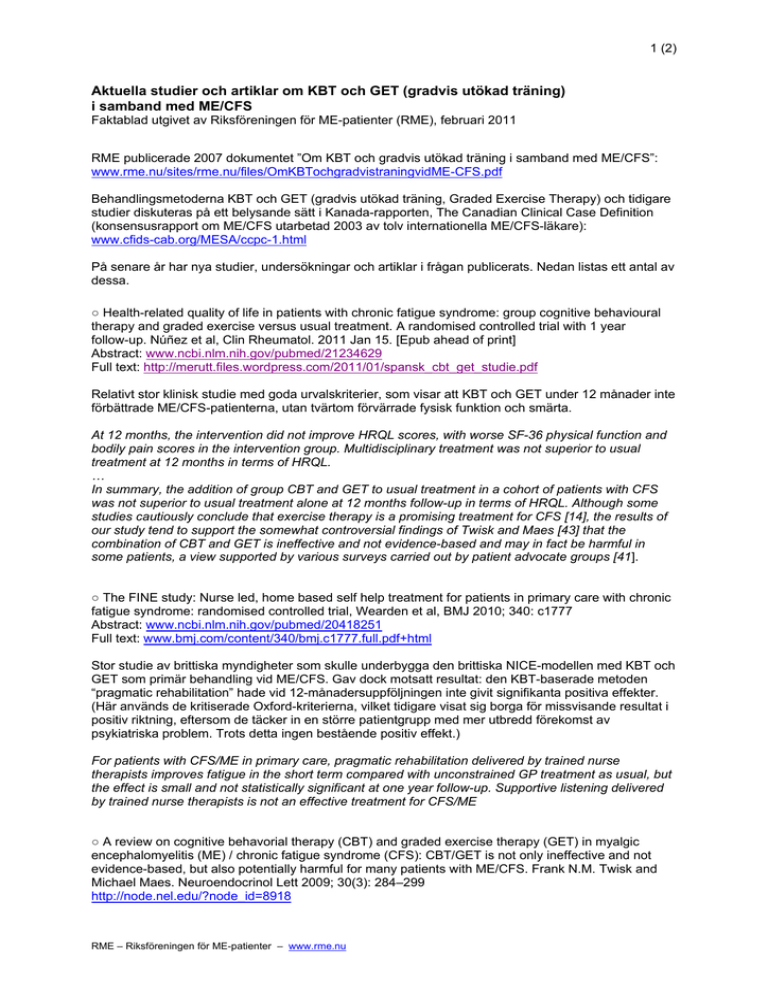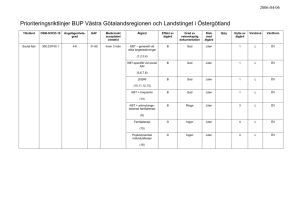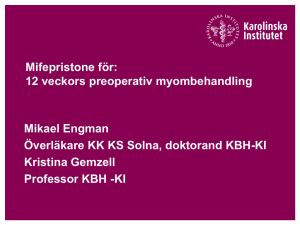Nya studier om KBT och gradvis träning (GET), februari 2011
advertisement

1 (2) Aktuella studier och artiklar om KBT och GET (gradvis utökad träning) i samband med ME/CFS Faktablad utgivet av Riksföreningen för ME-patienter (RME), februari 2011 RME publicerade 2007 dokumentet ”Om KBT och gradvis utökad träning i samband med ME/CFS”: www.rme.nu/sites/rme.nu/files/OmKBTochgradvistraningvidME-CFS.pdf Behandlingsmetoderna KBT och GET (gradvis utökad träning, Graded Exercise Therapy) och tidigare studier diskuteras på ett belysande sätt i Kanada-rapporten, The Canadian Clinical Case Definition (konsensusrapport om ME/CFS utarbetad 2003 av tolv internationella ME/CFS-läkare): www.cfids-cab.org/MESA/ccpc-1.html På senare år har nya studier, undersökningar och artiklar i frågan publicerats. Nedan listas ett antal av dessa. ○ Health-related quality of life in patients with chronic fatigue syndrome: group cognitive behavioural therapy and graded exercise versus usual treatment. A randomised controlled trial with 1 year follow-up. Núñez et al, Clin Rheumatol. 2011 Jan 15. [Epub ahead of print] Abstract: www.ncbi.nlm.nih.gov/pubmed/21234629 Full text: http://merutt.files.wordpress.com/2011/01/spansk_cbt_get_studie.pdf Relativt stor klinisk studie med goda urvalskriterier, som visar att KBT och GET under 12 månader inte förbättrade ME/CFS-patienterna, utan tvärtom förvärrade fysisk funktion och smärta. At 12 months, the intervention did not improve HRQL scores, with worse SF-36 physical function and bodily pain scores in the intervention group. Multidisciplinary treatment was not superior to usual treatment at 12 months in terms of HRQL. … In summary, the addition of group CBT and GET to usual treatment in a cohort of patients with CFS was not superior to usual treatment alone at 12 months follow-up in terms of HRQL. Although some studies cautiously conclude that exercise therapy is a promising treatment for CFS [14], the results of our study tend to support the somewhat controversial findings of Twisk and Maes [43] that the combination of CBT and GET is ineffective and not evidence-based and may in fact be harmful in some patients, a view supported by various surveys carried out by patient advocate groups [41]. ○ The FINE study: Nurse led, home based self help treatment for patients in primary care with chronic fatigue syndrome: randomised controlled trial, Wearden et al, BMJ 2010; 340: c1777 Abstract: www.ncbi.nlm.nih.gov/pubmed/20418251 Full text: www.bmj.com/content/340/bmj.c1777.full.pdf+html Stor studie av brittiska myndigheter som skulle underbygga den brittiska NICE-modellen med KBT och GET som primär behandling vid ME/CFS. Gav dock motsatt resultat: den KBT-baserade metoden “pragmatic rehabilitation” hade vid 12-månadersuppföljningen inte givit signifikanta positiva effekter. (Här används de kritiserade Oxford-kriterierna, vilket tidigare visat sig borga för missvisande resultat i positiv riktning, eftersom de täcker in en större patientgrupp med mer utbredd förekomst av psykiatriska problem. Trots detta ingen bestående positiv effekt.) For patients with CFS/ME in primary care, pragmatic rehabilitation delivered by trained nurse therapists improves fatigue in the short term compared with unconstrained GP treatment as usual, but the effect is small and not statistically significant at one year follow-up. Supportive listening delivered by trained nurse therapists is not an effective treatment for CFS/ME ○ A review on cognitive behavorial therapy (CBT) and graded exercise therapy (GET) in myalgic encephalomyelitis (ME) / chronic fatigue syndrome (CFS): CBT/GET is not only ineffective and not evidence-based, but also potentially harmful for many patients with ME/CFS. Frank N.M. Twisk and Michael Maes. Neuroendocrinol Lett 2009; 30(3): 284–299 http://node.nel.edu/?node_id=8918 RME – Riksföreningen för ME-patienter – www.rme.nu 2 (2) Analys av befintlig litteratur kring KBT och GET som behandling vid ME/CFS, där författarna lyfter fram de metodologiska problemen med de tidigare positiva studierna och går igenom möjliga fysiska orsaker till den vanliga försämringen hos ME/CFS-patienter vid ökad träning. Konklusion: bevisen för positiva effekter av KBT och GET är svaga, och risken för försämring är betydande. In this review we invalidate the (bio)psychosocial model for ME/CFS and demonstrate that the success claim for CBT/GET to treat ME/CFS is unjust. CBT/GET is not only hardly more effective than noninterventions or standard medical care, but many patients report that the therapy had affected them adversely, the majority of them even reporting substantial deterioration. Moreover, this review shows that exertion and thus GET most likely have a negative impact on many ME/CFS patients. Exertion induces post-exertional malaise with a decreased physical performance/aerobic capacity, increased muscoskeletal pain, neurocognitive impairment, “fatigue”, and weakness, and a long lasting recovery time. This can be explained by findings that exertion may amplify pre-existing pathophysiological abnormalities underpinning ME/CFS, such as inflammation, immune dysfunction, oxidative and nitrosative stress, channelopathy, defective stress response mechanisms and a hypoactive hypothalamic-pituitary-adrenal axis We conclude that it is unethical to treat patients with ME/CFS with ineffective, non-evidence-based and potentially harmful “rehabilitation therapies”, such as CBT/GET. ○ Cognitive behavioural therapy as a treatment for chronic fatigue syndrome (ME/CFS) – from the patients’ perspective. M.P. Koolhaas, H. de Boorder, E. van Hoof. ISBN: 978-90-812658-1-2. February 2008. English summary on page 4: http://home.planet.nl/~koolh222/cgtbijmecvsvanuitperspectiefpatient2008.pdf Enkätundersökning gjord av nederländska forskare på 100 patienter, som visar att KBT oftare rapporteras ge negativa effekter än positiva. Inga signifikanta förbättringar i antal aktiva timmar, och negativ utveckling av deltagande i arbete/studier. This pilot study, based on subjective experiences of ME/CFS sufferers, does not confirm the high success rates regularly claimed by research into the effectiveness of CBT for ME/CFS. Over all, CBT for ME/CFS does not improve patients’ well-being: more patients report deterioration of their condition than improvement. Our conclusion is that the claims in scientific publications about the effectiveness of this therapy based on trials in strictly controlled settings within universities, has been overstated and are therefore misleading. ○ Pasienterfaringer med ulike tiltak ved kronisk utmattelsessyndrom. Bjørkum et al. Tidsskr Nor Legeforen nr. 12, 2009; 129: 1214–6 http://pdf.tidsskriftet.no/tsPdf.php?pdf=pdf2009|1214-6.pdf Enkätundersökning gjord av norska forskare på 828 patienter, som befäster resultat från tidigare patientundersökningar i Storbritannien. Pacing, vila och avskärmning ger god effekt, medan GET försämrar tillståndet. I en klargörande tabell (Tabell 1) visas att hela 78,7% av patienterna uppger att GET ledde till förvärring. Däremot fann 96,4% att pacing gav positiv effekt. Hovedbudskap: - Aktivitetsavpasning, hvile, skjerming og ro oppleves som nyttig av de fleste pasientene i brukerundersøkelsen ... - En stor andel av deltakerne som har forsøkt gradert trening, mener det førte til forverring ○ The ME Association: Management Report. May 2010. www.meassociation.org.uk/wp-content/uploads/2010/09/2010-survey-report-lo-res10.pdf Enkätundersökning på ca 4000 ME/CFS-patienter, som ger samma bild som tidigare patientenkäter. 71% rapporterade att pacing förbättrade deras tillstånd, medan 55% uppgav att GET lett till försämring. RME – Riksföreningen för ME-patienter – www.rme.nu

